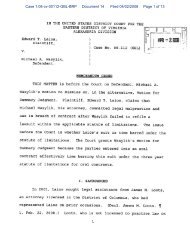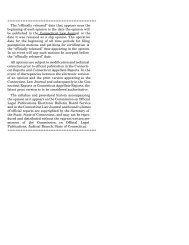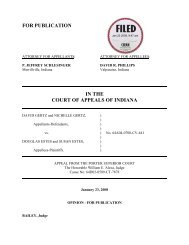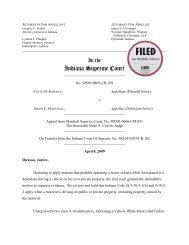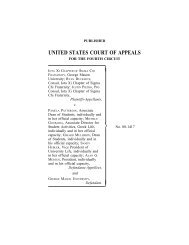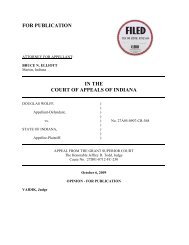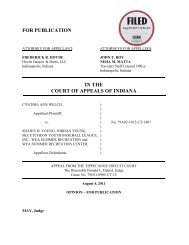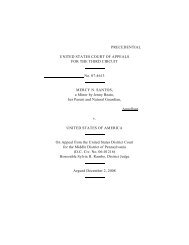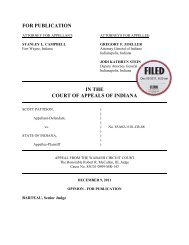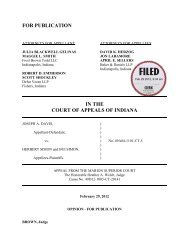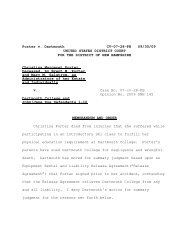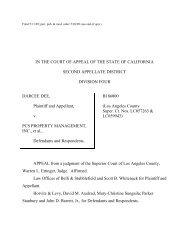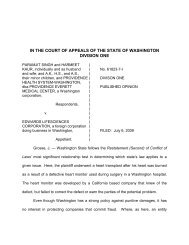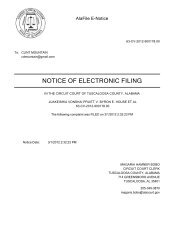141837-Opinion - Michigan Courts - State of Michigan
141837-Opinion - Michigan Courts - State of Michigan
141837-Opinion - Michigan Courts - State of Michigan
You also want an ePaper? Increase the reach of your titles
YUMPU automatically turns print PDFs into web optimized ePapers that Google loves.
that a municipality may be liable for an unlawful act <strong>of</strong> an <strong>of</strong>ficer if the act was done in<br />
the course <strong>of</strong> the <strong>of</strong>ficer’s <strong>of</strong>ficial duty or employment necessarily means that an <strong>of</strong>ficer<br />
can commit an unlawful act while “performing his or her duties.” Therefore, contrary to<br />
the majority’s suggestion, “in their lawful acts” and “performing his or her duties” are not<br />
even remotely synonymous. 6<br />
However, this is not to say that an <strong>of</strong>ficer who is “on the clock” is necessarily<br />
performing his duties or acting within the scope <strong>of</strong> his employment. Instead, an <strong>of</strong>ficer is<br />
performing his duties or acting within the scope <strong>of</strong> his employment when he is<br />
“‘“engaged in the service <strong>of</strong> his master, or while about his master’s business.”’” Hamed,<br />
490 Mich at 11 (citations omitted). “Although an act may be contrary to an employer’s<br />
instructions”-- or unlawful-- it is within the employee’s scope <strong>of</strong> employment “if the<br />
employee accomplished the act in furtherance, or the interest, <strong>of</strong> the employer’s<br />
obedience <strong>of</strong> the servant to his master’s orders, nor upon the legality <strong>of</strong> the servant’s<br />
conduct; where a servant is acting within the scope <strong>of</strong> his employment, and in so acting<br />
does something negligent or wrongful, the employer is liable, even though the acts done<br />
may be the very reverse <strong>of</strong> that which the servant was actually directed to do.’”) (citation<br />
omitted); Randall v Chicago & Grand Trunk R Co, 113 Mich 115, 119; 71 NW 450<br />
(1897) (“‘[T]he fact that the injury was occasioned by the negligent or unlawful acts <strong>of</strong><br />
the appellant’s employés would not make the appellant liable, unless it further appeared<br />
that the acts complained <strong>of</strong> occurred within the scope <strong>of</strong> the servants’ employment.’”)<br />
(citation omitted).<br />
6 Even the English common-law right to resist unlawful arrests did not apply to all<br />
unlawful arrests. Instead, “the cases in which the common law courts held that an illegal<br />
arrest created sufficient provocation to excuse resistance, generally involved police<br />
<strong>of</strong>ficers arresting individuals through truly outrageous conduct and ‘arbitrary assertions<br />
<strong>of</strong> authority.’” Hemmens & Levin, 29 Sw U L R at 12, quoting Chevigny, The Right to<br />
Resist an Unlawful Arrest, 78 Yale L J 1128, 1131 (1969). In particular, individuals did<br />
not have a right to resist “good faith” arrests, i.e., arrests made by police <strong>of</strong>ficers who had<br />
a good-faith belief that the arrest was lawful. Hemmens & Levin, 29 Sw U L R at 12.<br />
14



